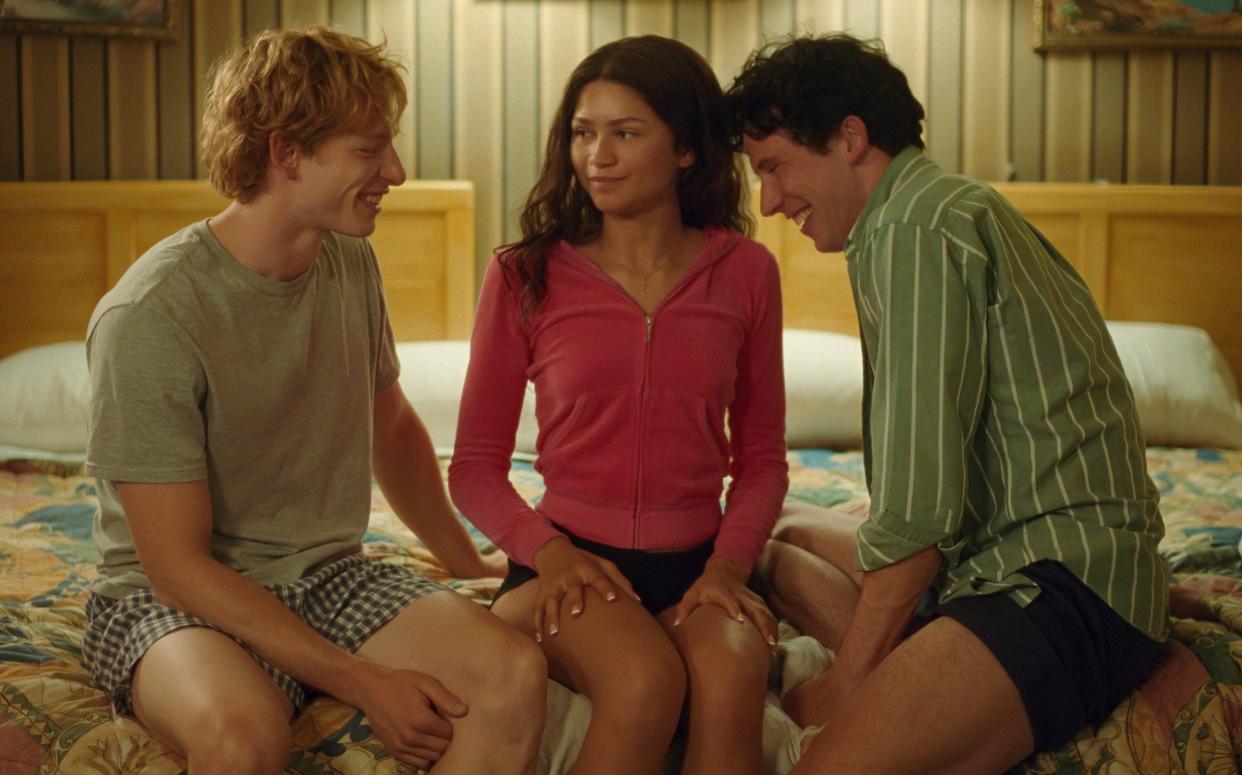The difficult truth about threesomes

Inviting a third person to the bedroom was something Rachel, a 44-year-old advertising director, had only ever talked about with her husband, Nick, 42, a producer. They’d been together for 10 years, married for eight and were parents to seven-year-old twins when Rachel boldly decided to arrange a surprise threesome for Nick’s 40th birthday.
“After so many years together, of course the kind of sex we were having was more ‘maintenance’ than ‘hot passion’,” Rachel says, “but compared with many girlfriends who didn’t seem to be having much sex with their husbands at all, I was always proud that Nick and I were still enjoying a good, fairly regular sex life (my idea of regular being twice a month, that is; admittedly Nick would probably have preferred more).
“Neither of us is into anything particularly kinky; we are certainly what would be described as ‘vanilla’ in our tastes. Some nice underwear and a bit of role-play or slightly ‘smutty talk’ was about our limit. The idea of ‘wife swapping’ would have been hilarious and also horrifying and not our bag at all.”
“A threesome is the most popular of all sexual fantasies,” says social psychologist Dr Justin Lehmiller, of the Kinsey Institute, Indiana University. He interviewed more than 4,000 Americans for his book Tell Me What You Want: The Science of Sexual Desire and How It Can Help You Improve Your Sex Life, and found that 95 per cent of men and 87 per cent of women said they fantasise about sex with more than one partner.
But while – in our minds, at least – three may be the magic number, whether or not this translates to reality is another matter. As Dr Lehmiller warns: “As a concept it has an enduring appeal, but a threesome is also the sexual fantasy with the most potential not to live up to expectations.”
Interestingly, his research proved that a three-way fantasy was most commonly enjoyed by older people in their 40s and 50s, who thought about them the most – and were indeed more likely to act them out. By mid-life, “people are settled in long-term monogamous relationships and sex has become routine,” he says. “Fantasising about bringing another person into the mix can be a way of seeking to fulfil our very human desire for novelty.”

Two years ago, for Nick’s 40th birthday, Rachel decided it was now or never to try something more adventurous and leave their comfort zone.
“I’d once kissed another girl years ago in my student days; I never doubted I was ‘straight’ but having a proper grown-up sexual experience with a woman was something I’d always wanted to try,” she says. “Forty is one of those milestones that make you feel like doing something risqué and a bit wild before we become decrepit. And if I’m honest, I also wanted Nick to think what a ‘cool’ wife I was. I quite liked the thought of him boasting to friends about how liberated we were.”
Rachel invited Rosa*, one of her more open-minded single friends, to come to the couple’s north-west London home. Rosa seemed a good choice as she wasn’t a close friend, but from drinking in the same social circles the women had enjoyed frank, funny and slightly flirty chats about sex.
Donning party dresses and nice underwear, Rachel and Rosa served champagne and oysters as a knowing aphrodisiac joke, and to Nick’s delight within an hour all three ended up in bed.
“I suppose I’d describe myself as being a bit ‘performative’ in bed, a show-off, basically,” says Rachel. The idea of putting on a bit of a sexy show with another woman and exciting Nick was a turn-on. I knew he would be amazed I’d actually made it happen and wanted to enjoy that surprise.”
Natasha Silverman, a sex therapist with Relate, says that situations such as Rachel’s are relatively common. “When we unpack our clients’ peak sexual fantasies, threesomes are commonly mentioned during therapy,” she says. “For many it’s the intrigue of the taboo, as many fantasies are not politically correct. It’s breaking away from the ‘norm’ along with a desire for more sexual attention that appeals. For others the fantasy might be watching their partner be pleasured by another person.
Jealousy is the obviously potentially negative aspect of a threesome. But Silverman says this can – surprisingly, perhaps – be part of the appeal. “A difficult but fascinating truth is that for many relationships insecurity, instability and novelty are potent aphrodisiacs – we see this play out in make-up sex, break-up sex, ‘shouldn’t-have’ sex, and many other kinds of sex,” she says. “Jealousy can actually fuel sexual desire, excitement, intrigue and arousal. But playing out fantasies should be a way to enrich a sexual relationship rather than save it.”
The green-eyed monster was something Rachel didn’t fully anticipate before she entered into her three-way. “I was jealous of everything that happened between Nick and Rosa,” she admits. “It all felt like a competition, between her and me and also – to my surprise – between me and Nick. He seemed so much better at pleasing her than I was. I wasn’t prepared for him to be sort of… outperforming me. It felt like she was lapping it up and wasn’t terribly interested in me. I do realise she probably thought the whole point was for his benefit, but I didn’t enjoy feeling left out.”

Peter Saddington, a sex therapist with Relate, says jealousy and insecurity can be common, though as he points out, he mostly meets couples who come to him only once “something has gone wrong. It’s crucial to address these feelings openly and offer reassurance and support to each other and enthusiastic consent from all parties is vital.” He also says issues can arise if one person becomes drawn to the additional partner, causing strain on the original relationship.
“Tread carefully when thinking about bringing in a third person into a relationship that is struggling, or where one or both partners will likely feel threatened, rejected, or unwanted,” warns Silverman. She suggests that if there are already issues, bringing in a third person could make it worse, and the whole set-up has the potential to open the floodgates to feelings of pressure to perform or disappointment.
“In my head it was so sexy, but the reality was more awkward, clumsy and weird,” admits Rachel. “I realised I didn’t know how to touch Rosa properly and I felt like an amateur and was squeamish about going down on her.”
While Rachel had talked with Rosa beforehand about what would happen in the bedroom, neither of them had thought to speak about what would happen afterwards. “We sort of lay in bed together for a bit afterwards and I felt like I had to be the host and make Rosa a drink but I just wanted to immediately order her a taxi. There was something about seeing her head resting on my husband’s bare chest that felt strangely more intimate than anything else. I couldn’t wait to get all the bedding in the wash.”
Silverman says this reaction is common. “The reality is after having the opportunity to play out a fantasy, some people are surprised to discover that it was all more sexually potent and satisfying in their minds than it had been in reality. People can feel disappointed when their desires don’t hit the spot in real life, but try and remember this is absolutely fine – it’s not a failure, and you’ll never know unless you try.”
While the three of them all agreed to each other that it had been fun, it did lead to arguments between the couple.
“The next day, we rowed when he was grinning like the Cheshire Cat and I felt moody. We’ve chalked it up to experience now and stopped talking about this fantasy but if we ever did it again I’d want it to be another man who I’d never have to see again. Now, whenever I see Rosa out and about, I feel myself comparing us and wondering if Nick ever thinks about her when we are in bed. Nick denies he would, but it did bring an undercurrent of resentment into our marriage for a while. I don’t regret my threesome as it was on my bucket list, so to speak, but it wasn’t the simple wild, liberating act I’d anticipated.”
Knowing when a threesome is for you
Manage expectations. While threesomes are the most popular fantasy, says Justin Lehmiller, they’re also the one with the most potential not to live up to expectations. “There’s more variability in experience compared to other fantasies,” he says. “People don’t have a script for how they go and don’t communicate much beforehand, so there’s often a lot of uncertainty and unexpected emotions sometimes pop up.”
“Threesomes may not be suitable for relationships that are not secure or have underlying issues,” warns Peter Saddington. “Or one partner is keen and the other is not.”
“Couples also need to keep the needs and well-being of the third person in mind, and how to ensure the third is confident that their own rules and boundaries matter just as much as the couple’s agreement,” says Natasha Silverman. “Whether the third person is someone who has been and will continue to be in the couple’s life for some time, or someone who is a temporary addition to the couple’s life, it’s important to remember that they are not only a way to fulfil a fantasy or an object of desire, but a real person who will have their own sexual and emotional experience with the couple.”
Before you proceed
Enthusiastic consent from all parties is vital.
Communication is key: couples should discuss boundaries, desires and needs openly and honestly.
Don’t forget the feelings and boundaries of the third person involved.
Offer reassurance and support to each other during and after.
Sexually transmitted infections among older people have risen. Always practise safe sex and remember to keep any sex toys clean.
Relate’s services include relationship counselling and sex therapy. You can attend on your own, as a couple or with more than one partner. Find out more at relate.org.uk.


